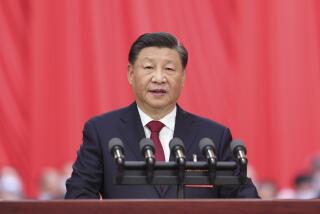Little Effect on China’s Economy Expected From Passing
- Share via
In life, Deng Xiaoping is credited with helping to spur a massive transformation of China’s centrally controlled economy and its ties to the West. But the passing of China’s “paramount leader,” experts say, probably will have little effect on what has become one of Asia’s most vibrant economies.
That’s because President Jiang Zemin, who has in effect been governing China since Deng disappeared from public view several years ago, has clearly committed his government to continuing down the path of economic reform that has turned the world’s largest Communist country into a formidable trader and key market for U.S. firms expanding overseas.
“I think Deng’s two great successes are launching China on the road to prosperity and putting in place a team of leaders who could carry on after him,” said Clyde Prestowitz, president of the Washington-based Economic Strategy Institute.
Similar sentiments were expressed by U.S. business executives with interests in China, who shrugged off Deng’s death as a long-anticipated historic moment with few implications for their bottom lines.
U.S. financial markets also showed little interest in Deng’s passing, with the dollar showing a brief uptick and stocks and bonds hardly moving.
“Outside China, people seemed to think when he [Deng] died it would be a major event,” said Ed Muller, president of Edison Mission Energy of Irvine, which is working on two big energy projects in China. “But, within China, for people doing business there, he wasn’t really in the picture anymore.”
If anything, some believe Deng’s death will make it easier for China’s leaders to move ahead more boldly on the economic front, since they will no longer be forced to operate in the shadow of the powerful Chinese leader.
“If Jiang can consolidate his power in the next few months, I think it smooths the way for making the kind of concessions necessary to have China enter the WTO,” said Gary Hufbauer, an economist with the Washington-based Institute for International Economics, referring to the key international regulatory group, the World Trade Organization.
The rest of the world has a huge stake in the stability of the Chinese economy, which has become the proverbial 800-pound gorilla thanks to the free-market reforms introduced by Deng in the late 1980s. In less than two decades, China has become the world’s third-largest economy, and it is expected to eclipse the United States and Japan sometime early in the next century.
Just how vigorous capitalism has become in China was highlighted by U.S. trade figures Wednesday showing that America’s deficit with the Chinese had expanded to a record $39.5 billion, the largest yearly deficit with any country outside Japan.
The trade imbalance, which U.S. Commerce Secretary Bill Daley blamed on China’s closed markets, is one of several potentially fractious economic issues on the U.S.-China agenda, along with China’s accession to the WTO, the global trade treaty and piracy of software, movies and music.
But Deng’s death shouldn’t affect those negotiations because Jiang and his economic team, led by Zhu Rongji, have been overseeing the country’s economy for the past three to four years, according to David Bachman, head of the China studies program at the University of Washington in Seattle.
He said China’s present leaders appear to agree on the need for greater trade liberalization, keeping inflation in check and tackling the country’s most troublesome domestic issue, the debt-laden state-owned industries.
“Everything’s going to slow down for a little while while everyone figures out how things are going to work,” Bachman said. “But I don’t see any real policy changes coming.”
China watchers predicted that China’s latest effort to gain entry to the WTO--which included a verbal agreement to abandon many of its largest trade barriers, including some of the laws that protect state- and military-run industries from foreign competition--will stay on the table. The key issue appears to be whether China and its major trading partners can agree on how quickly those trade barriers must come down.
“The recent discussions sound good, but I think the devil is in the details here,” Prestowitz said.
(BEGIN TEXT OF INFOBOX / INFOGRAPHIC)
Era of Prosperity
The Deng Xiaoping era saw dramatic improvements in the material lives of the Chinese people. Here is a comparison of key standard of living indexes from 1978, when Deng took power, and 1995, the latest year for which data are available.
PER CAPITA CONSUMPTION (In kilograms)
*--*
1978 1996 Grain 196 97 Pork 7.7 17.2 Fresh eggs 2.0 9.7
*--*
****
CONSUMER DURABLES (Ownership per 100 people)
*--*
1978 1996 Sewing machines 3.5 63.7 Radios 7.8 18.8 TVs 0.3 89.8
*--*
****
MEDICAL SERVICES (Per 10,000 people)
*--*
1978 1996 Doctors 10.8 15.8 Hospital beds 19.4 23.4
*--*
****
HOUSING SPACE PER CAPITA (In square meters)
*--*
1978 1996 Cities 3.6 8.1 Villages 8.1 21.0
*--*
****
AUTOMOBILES
*--*
1978 1996 Autos 0 2.5 mil.
*--*
Source: China State Statistical Bureau
More to Read
Inside the business of entertainment
The Wide Shot brings you news, analysis and insights on everything from streaming wars to production — and what it all means for the future.
You may occasionally receive promotional content from the Los Angeles Times.







